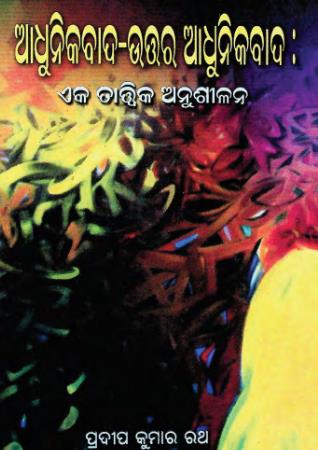Adhunikabad-Uttara Adhunikabad: Eka Tattwika Anusilana, authored by Pradip Kumar Rath and published in 2013, is a significant work in the realm of Odia literature that delves into the complexities of modernism and its manifestations within the cultural and literary landscape of Odisha. The book presents a thoughtful analysis of modernity, connecting philosophical discourse with practical implications in contemporary society. Rath’s essays not only highlight the characteristics of modernism but also provoke critical reflection on the evolution of identity, tradition, and artistic expression in a rapidly changing world.
Rath’s work is composed of several essays, each exploring different dimensions of modernism in the context of Odia culture. The title “Adhunikabad-Uttara Adhunikabad” translates to “Modernity and Beyond Modernity,” suggesting a journey through the ideas that define modern thought and their subsequent implications on the future. The book is structured to engage readers in a dialogue about the fluidity of modernism, its philosophical roots, and its societal impacts, making it an essential read for anyone interested in modern Odia literature and culture.
One of the central themes of Rath’s essays is the interplay between tradition and modernity. He argues that modernism does not necessarily reject traditional values but rather seeks to reinterpret them in light of contemporary realities. This reconciliation of past and present is crucial for understanding the socio-cultural dynamics in Odisha. Rath delves into how modern ideas have influenced literature, art, and social structures, arguing for a nuanced understanding of what it means to be modern in an increasingly globalized world.
Another important aspect of the book is its critical examination of identity. Rath explores how modernism has reshaped individual and collective identities in Odisha. He discusses the tensions that arise when traditional identities confront modern values and the ways in which people navigate these challenges. The essays encourage readers to reflect on their identities in relation to broader societal changes, prompting a conversation about self-perception in an era of rapid transformation.
Rath also addresses the philosophical underpinnings of modernism, drawing from various intellectual traditions to underline how ideas of individualism, rationality, and progress have influenced Odia literature. He discusses key figures in modern Odia writing and their contributions to this new narrative, illustrating how their works mirror the complexities of their time. By doing so, Rath connects the evolution of modern thought to the literary expressions of prominent Odia writers, establishing a continuum of influence and response.
Rath’s writing style is characterized by its clarity and accessibility, making complex ideas comprehensible to a broad audience. His use of examples from both literature and everyday life enriches the essays, providing tangible contexts for abstract concepts. Rath employs a critical yet engaging tone, encouraging readers to think deeply about the themes he presents.
Throughout the book, Rath integrates literary analysis with sociological discourse, creating a multidimensional approach to his subject matter. The essays are interspersed with thought-provoking questions that challenge readers to grapple with their own views on modernity and its implications. This interactive element enhances the reading experience, making it not only informative but also personally relevant.
In “Adhunikabad-Uttara Adhunikabad,” Rath does not shy away from critiquing certain aspects of modern society. He addresses issues such as consumerism, the erosion of traditional values, and the alienation that can accompany modern living. These critiques serve as a warning against uncritical acceptance of modernity, urging readers to remain vigilant about the cultural shifts occurring around them.
Rath emphasizes the importance of dialogue in navigating the challenges posed by modernism. He advocates for a synthesis of old and new, suggesting that true modernity lies in the ability to draw from diverse influences while remaining grounded in one’s cultural heritage. This idea resonates throughout the essays, reinforcing the notion that modernism is not a monolithic concept but rather a dynamic interplay of various forces.
Adhunikabad-Uttara Adhunikabad: Eka Tattwika Anusilana is a thought-provoking and comprehensive exploration of modernism in the context of Odia literature and culture. Pradip Kumar Rath’s essays encourage readers to engage with the complexities of modernity, prompting reflection on identity, tradition, and the societal changes shaping contemporary life. The book stands as a testament to the rich intellectual discourse occurring within Odia literature, highlighting the pressing relevance of modernism in today’s world.
Rath’s work challenges us to consider our place within the currents of modernity, urging us to reflect critically on our values, beliefs, and identities. As we navigate the ever-changing landscape of contemporary society, Adhunikabad-Uttara Adhunikabad offers valuable insights into the challenges and opportunities that arise at the intersection of tradition and modernity. For students, scholars, and general readers alike, this collection of essays serves as an important resource, inviting an ongoing conversation about the nature of modern existence and its impact on the cultural fabric of Odisha.
Books Info
| Books name | Adhunikabad-Uttara Adhunikabad, Eka Tattwika Anusilana |
| Author | Pradip Kumar Rath |
| No Of pages | 44 |
| Publisher | Kshyanaprabha Prakashani |
| Publication | 2013 |
| Printed At | Subarna Printers |
| Distributor | NA |
Adhunikabad-Uttara Adhunikabad, Eka Tattwika Anusilana Sample
Adhunikabad-Uttara Adhunikabad, Eka Tattwika Anusilana Full Pdf Download

